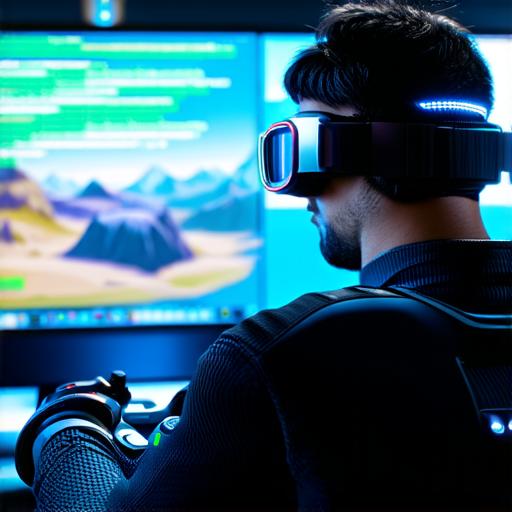In today’s world, video games have become an integral part of our lives, providing entertainment and relaxation to millions of people worldwide. As such, there has been a growing demand for individuals who can create these immersive experiences. But what does it mean to be a video game developer? This article will explore the role of a video game developer, their responsibilities, and the skills required to excel in this field.
The Role of a Video Game Developer
Skills Required for Video Game Development
Technical Skills
- Programming: Knowledge of programming languages such as C++, Java, or Python is essential for creating games. Developers must be able to write efficient and optimized code that runs smoothly on different platforms.
- Game Engines: Familiarity with game engines such as Unreal Engine or Unity is crucial for creating modern games. These engines provide a set of tools and frameworks that simplify the game development process.
- Art and Design: Understanding of art and design principles is essential for creating visually appealing games. Developers must be able to create 3D models, textures, and animations that are optimized for different platforms.
- Sound Production: Knowledge of sound production techniques is important for creating immersive audio experiences. Developers must be able to create or source high-quality sound effects, music, and voiceovers.
Creative Skills
- Conceptualization: The ability to come up with new and innovative ideas for games is essential for successful game development. Developers must be able to think creatively and outside the box to create unique and engaging experiences.
- Level Design: Knowledge of level design principles is crucial for creating fun and challenging levels. Developers must be able to design layouts that are both visually appealing and optimized for gameplay.
- Storytelling: The ability to tell a compelling story through games is essential for capturing the player’s imagination. Developers must be able to write engaging dialogue, create memorable characters, and develop plot arcs that keep players coming back.
The Future of Video Game Development
Case Studies in Video Game Development
Super Mario Bros.
Super Mario Bros.
is a great example of how video game development has evolved over time. In the 1980s, Nintendo released the NES (Nintendo Entertainment System), which revolutionized the gaming industry. Developers Shigeru Miyamoto and Takashi Tezuka created
Super Mario Bros.
, which became one of the most successful games of all time.
Minecraft
Minecraft
. Created by Swedish programmer Markus Persson,
Minecraft
has become one of the most popular games of all time. The game’s success was due in part to its open-world gameplay and its ability to allow players to create their own content.
The Witcher 3: Wild Hunt
Conclusion
FAQs
1. What skills are required for video game development?
- Technical skills: programming, game engines, art and design, sound production
- Creative skills: conceptualization, level design, storytelling
2. What is the role of a video game developer?
Video game developers are responsible for creating and designing video games. They work on various aspects of game development, including conceptualization, programming, art design, animation, and sound production.
3. How has video game development evolved over time?
With the increasing popularity of smartphones and tablets, mobile gaming has become a lucrative industry, providing opportunities for independent developers to break into the game development world. New tools and technologies are also emerging that make it easier than ever for developers to create immersive experiences, such as virtual reality (VR) and augmented reality (AR).
4. What are some examples of successful video game developers and their work?
-
Super Mario Bros.
-
Minecraft
-
The Witcher 3: Wild Hunt

5. What is the future of video game development?
As technology continues to evolve, video game development is also changing rapidly. New tools and technologies are emerging that make it easier than ever for developers to create immersive experiences.
